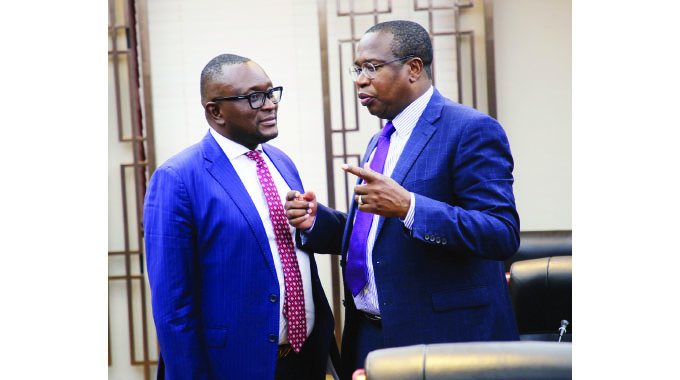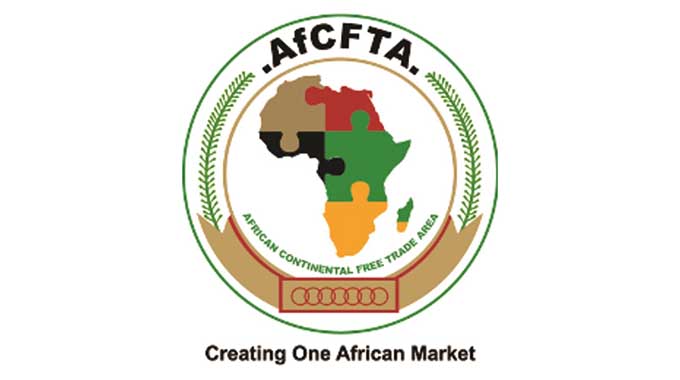Majority of households reap benefits of improved economic outlook

Cabinet received an update on the country‘s response to the Covid-19 pandemic, and roll-out of vaccines, as presented by the chairman of the Ministers’ Committee on the National Covid-19 Response, Honourable Vice President and Minister of Health and Child Care, Gen (Rtd) Dr CGDN Chiwenga.
The nation is being informed that the cumulative Covid-19 cases as at 30 May, 2023 stood at 265 031, with 259 128 recoveries and 5 694 deaths. There were 209 active cases. Two deaths were recorded during the week under review. There were 11 new admissions, compared to the 13 recorded the previous week, with 4 being in intensive care.
Regarding the national vaccination programme, a total of 7 317 020 first doses, of the COVID-19 vaccine, 5 477 550 second doses and 2 114 097 third doses respectively have so far been administered. Cabinet is urging all those who have not yet been vaccinated to do so.
UPDATE ON THE CHOLERA OUTBREAK RESPONSE
Cabinet received an update on the ongoing cholera outbreak response, which was presented by Dr Chiwenga.
The nation is informed that as of 28 May 2023, Zimbabwe’s cumulative suspected cases had reached 1 649, with 1 528 recoveries and 11 deaths.
Regarding the regional situation, six African countries have now reported cholera outbreaks since the beginning of the year.
Meanwhile, Cabinet wishes to assure the nation that the cholera risk assessment is ongoing in all provinces in order to determine the targeting of oral cholera vaccination.
SUMMER CROPS MARKETING AND WINTER WHEAT PLANTING UPDATE
Cabinet received an update on summer crops marketing and winter wheat planting which was presented by the Minister of Lands, Agriculture, Fisheries, Water and Rural Development, Honourable Dr AJ Masuka.
Cabinet wishes to inform the nation that grain stocks held by the Grain Marketing Board as at 28 May 2023 stood at 200 658 tonnes of maize, 36 863 metric tonnes of traditional grains, and 147 748 tonnes of wheat.
Millers are being allocated 27 000 tonnes of maize, while SILO Food Industry is being allocated an additional 16 000 tonnes. At this rate, the grain will last for the next 5.5 months. The wheat stocks in the country provide 8.4 months’ cover, and at an allocation rate of 21 000 tonnes per month, they are enough to last until the next intake in August/September 2023. The grain intake (maize, soya bean and sunflower) by the GMB for this season now stands at 10 362.
The nation is being informed that a total of 47 562 hectares were planted under wheat as at 28 May 2023. This is 41 percent above last year’s figure. There is improved electricity supply across the provinces for wheat production.
With regard to tobacco, the nation is being informed that to date, a total of 227 million kg has been sold at an average price of US$3,01/kg, compared to 146 million kg sold at an average price US$3/kg in the 2021/22 season. This represents a 52.33 percent increase in sales. Most of the tobacco is being exported to China, United Arab Emirates, South Africa, Belgium, Egypt and Indonesia.
As for cotton, the nation is being informed that the Agricultural Marketing Authority has established 862 sales points for this marketing season. COTTCO is expected to purchase 85 percent of the cotton under the Government Support Scheme.
STATE OF PREPAREDNESS FOR THE 2023/2024 SUMMER CROPPING PROGRAMME
Cabinet received and considered the report on the state of preparedness for the 2023/2024 summer cropping programme as presented by Dr Masuka.
The nation is being informed that preparations for the 2023/2024 summer season are commencing early in order to limit the disruption of logistics in the movement of fertilisers, fuel and other inputs as the year progresses.
Early indications point towards suppressed rainfall amounts during the 2023/2024 summer season, hence the need to strengthen climate-proofed agriculture through improved agro-ecological tailoring of crops, enhancing business advisory services and entrenching the farmer field schools concept.
Cabinet wishes to advise the nation that a number of strategies will be implemented to increase productivity of all crops, including the following: information dissemination and technology transfer by up-scaling the farmer field schools per village concept; intensification of use of digital platforms and online applications; capacity building through intensive in-service training of agricultural extension officers; liming and soil reconditioning; climate proofing and irrigation development.
The other strategies include enhancing input support and availability; ensuring affordable financing; strengthening smallholder and large scale mechanisation; and implementing a grain swap scheme at the Grain Marketing Board (GMB).
The Government Climate–Proofed Presidential Input Programme will target 3,5 million farmers from communal, A1, small-scale commercial farming, old resettlement and the transient urban cultivation sectors for cereals, oilseeds and legumes.
The programme will support 5 Pfumvudza plots per household with an agro-ecological region-specific crop input package for maize, sorghum, pearl millet, soya beans, sunflower, groundnuts, vegetables and African peas. The Zunde RaMambo scheme will support 10 plots for chiefs, 7 plots for headmen and 5 plots each for village heads.
The Pfumvudza/Intwasa package for each household will be as follows: a 10kg pack of maize seed for farmers in regions 1 and 2; a 5kg pack for those in region 3; and a 2kg pack of either sorghum or pearl millet seed for those in regions 4 and 5. Each farmer will also receive a 50kg bag of basal fertiliser, top-dressing fertiliser and lime.
The package per farmer for other optional crops will be 2kg each for sorghum, sunflower, sugar beans and groundnuts as well as 1kg of pearl millet and African peas.
Regarding the target for the 2023/2024 cotton Pfumvudza/Intwasa programme, the nation is being informed that two plots of 0,25 hectares will be required for each grower to access inputs. The programme has a tillage component and support for hybrid cotton varieties.
Pertaining the Presidential Rural Development Programme, the target for 2023/2024 is to drill 2 200 boreholes, distribute three fruit trees, seed for traditional vegetables and sweet potato vines to 3 million households throughout the country. The type of fruit trees to be grown will be determined by the respective agro-ecological regions.
ZIMBABWE VULNERABILITY ASSESSMENT (ZIMVAC) 2023: URBAN LIVELIHOODS REPORT
Cabinet considered the Zimbabwe Vulnerability Assessment Committee (ZIMVAC) 2023 Urban Livelihoods Assessment Report as presented by Dr Chiwenga as chairperson of the Cabinet Committee on Food Security and Nutrition.
The nation is informed that the 10th annual urban livelihoods assessment was undertaken from 23 January to 10 February 2023. The objective of the assessment was to guide evidence-based planning and programming for targeted interventions; develop solutions that address immediate to long-term needs as well as build resilient livelihoods.
Cabinet wishes to inform the nation that the 2023 urban livelihoods assessment was undertaken against the background of geo-political events in Eastern Europe and the devastating effects of the Covid-19 pandemic, which negatively impacted on livelihoods.
The Government instituted various mitigatory and people-centred measures such as supporting the vulnerable groups; implementation of the Presidential Borehole Drilling Scheme; support for the transient urban cultivation programme; implementation of the Emergency Road Rehabilitation Programme; funding of the National Public Infrastructure Investment Programme; and strengthening of Multi-Sectoral Structures.
Regarding social protection, there was evidence that Zimbabwe’s economic growth trajectory benefited the majority of households. About 17,7 percent of the households received support from relatives, while 16.7 percent got institutional assistance. The Government improved the economic environment that has seen average incomes continue on a positive growth from an average of $15 805 in 2020 to $189 304 in February 2023. The assessment found a positive trend in the economy as 50 percent of households were able to reduce their debt burden. Nationally, 21 percent of the households had outstanding debts, a reduction from 45 percent found in 2020. Government facilitated implementation of social safety nets in order to ensure that vulnerable populations are well protected.
Pertaining to child nutrition, a cocktail of strategies and measures being implemented by Government, particularly from the Ministry of Health and Child Care has seen an improvement in exclusive breastfeeding practices. The proportion of children exclusively breast fed increased from 49.3 percent in 2020 to 78,4 percent in 2023. The Government also surpassed the 90 percent target for Vitamin A supplementation of children of 6 to 11 months of age.
Cabinet wishes to inform the nation that various mitigatory measures were implemented such as supporting the vulnerable groups through distribution of food aid and harmonised social cash transfers; Presidential Borehole Drilling Scheme for provision of clean water to urban areas to help avert the potential threats of waterborne diseases; and agriculture input support programmes.
NATIONAL MIGRATION POLICY FOR ZIMBABWE
Cabinet considered and approved the National Migration Policy for Zimbabwe as presented by the Minister of Finance and Economic Development, as Chairperson of the Cabinet Committee on National Development Planning, Honourable Professor M Ncube.
The nation is advised that the National Migration Policy seeks to address migration concerns, and to integrate migration in development. The Policy will therefore provide a basis for effectively harnessing migration for the development of the country. Zimbabwe faces multi-faceted migration challenges that include skills flight; trafficking in persons; migrant smuggling; mixed migration flows; and irregular labour migration. The attendant challenges, including the relationship between migration and climate change, increases the incidence of epidemics and emergent security threats. This calls for a well managed migration to ensure the country‘s security and optimal protection of our sovereignty.
The National Migration Policy comprises of 20 thematic areas which are in line with the National Development Strategy 1 (NDS 1). The policy is also informed by the 2030 agenda for Sustainable Development Goals (SDGs), the Global Compact for Migration (GCM), the Migration Governance Framework, the African Union Migration Framework and the Southern African Development Community (SADC) policy frameworks that are aimed at promoting safe, orderly and humane migration.
The policy aims to achieve the following: strengthen legal and institutional frameworks to derive maximum benefit from migration as well as aiding the socio-economic support systems of migrants and society; develop a Labour Migration Information System that will gather reliable and accurate data on labour migrants abroad by gender, profession, duration of stay, wages and salaries and working conditions; to include Diasporans in the process of national development by developing a national migrant remittances framework; and strengthening the capacity of Zimbabwe diplomatic missions to promote tourism.
Cabinet noted that discrimination, xenophobia and racism are increasingly becoming issues of great concern to both sending, transit and receiving countries. Zimbabwe has already promulgated the Prevention of Discrimination Act which prohibits and criminalises discrimination. Therefore combating discrimination, xenophobia and racism is an essential element of a comprehensive National Migration Policy.
REPORT BY THE NATIONAL COMMITTEE ON DRUG AND SUBSTANCE ABUSE
Cabinet considered and approved the report on drug and substance abuse as presented by the Minister of Defence and War Veterans Affairs as chairman of the National Committee on Drug and Substance Abuse, Honourable Cde Oppah Chamu Zvipange Muchinguri-Kashiri, As the nation may recall, Cabinet established this committee on 19 April 2023 in order to up-scale the fight against the supply of illicit drug and substance abuse. The nation is being informed that progress recorded to date includes the following:
• Drugs and substances worth Z$438 654 692 were intercepted under Operation Clean-Up Zimbabwe with 6 156 accused persons being arrested and prosecuted across the country;
• A lot of people were reached with anti-drug information dissemination and campaigns through provincial and district structures;
• An out-patient rehabilitation and psyco-social support centre has since been established in Harare and similar centres will be set up in other provinces;
• Assessment visits made to ports of entry and exits to ascertain illegal drug and substance trafficking; and
• Visits to mental health institutions and rehabilitation centres.
As a way forward, a National Plan of Action has since been adopted. Its key components include the following:
a) that the Law Enforcement Units specialized in drug and substance abuse response be decentralized coupled with equipping the Zimbabwe Republic Police’s Forensic Laboratories by the end of the Second Quarter;
b) that seamless sub-national structures and family structures to heighten the response to the drug and substance abuse fight be established by end of Third Quarter of 2023;
c) that multi-sectoral awareness campaigns be conducted to reduce the demand for drugs with religious leaders playing an active role in fighting the scourge through demand reduction;
d) that there be robust resource mobilization for all activities and encourage Corporate Social Investment by the private sector under this programme; and
e) that legal frameworks and policies on drug and substance abuse be reviewed and updated immediately.
Going forward, a National Coordinator will be appointed to coordinate policies and activities on drug and substance abuse. Government will establish rehabilitation and psycho-social support centres for drug and substance abuse survivors in order to ensure full rehabilitation and recovery. Cabinet warns all those who are selling liquor without the requisite liquor licences to desist from doing so and the law enforcement agents will take action against those in defiance of the statutes. The Nation Action Plan on Drug and Substance Abuse will be launched by His Excellency the President at a date to be advised.
8.0 PRINCIPLES OF THE TEACHING PROFESSIONAL COUNCIL BILL
Cabinet approved the Principles of the Teaching Professional Council Bill as presented by the Minister of Primary and Secondary Education, Honourable Dr Evelyn Ndlovu.
The nation is being informed that since the attainment of independence in 1980, the country’s robust education system has been producing highly skilled graduates who are playing a pivotal role in socio-economic development and who are sought after regionally and internationally. The proposed Bill will deal with quality assurance in teaching and learning with a view to professionalise the teaching service. As such, a Teaching Profession Council will be established as a regulatory body. The Council will also promote mandatory continuous professional development of teachers in order to ensure that the teachers have the requisite skills and competencies. The detailed objectives of establishing the Teaching Professional Council of Zimbabwe are to, inter alia:
• Professionalise the teaching service and enhance the public standing of teachers;
• Provide an independent, representative and self-regulated board to champion issues around the teaching profession;
• Improve and maintain high quality professional standards for teachers;
• Strengthen the professionalism in the education sector; and
• Promote the Zimbabwean philosophy of unhu/Ubuntu and holistic education.
The Teaching Profession Council will comprise 15 members drawn from different organisations provided in the Bill and its functions will include, among others, the following:
•To regulate the professional conduct of teachers;
•To investigate allegations of professional misconduct and impose such sanctions as may be necessary for members who are not members of the public service; and
•To advise the Government on matters relating to the teaching profession.
It is envisaged that the establishment of the Teaching Profession Council will contribute towards arresting decline in morale and behaviour standards in the practice of teaching and raise the dignity of the teacher.
9.0 REPORT ON THE 2ND SESSION OF THE ZIMBABWE-RWANDA JOINT PERMANENT COMMISSION ON COOPERATION
Cabinet received and adopted the Report on the 2nd Session of the Zimbabwe-Rwanda Joint Permanent Commission on Cooperation held in Harare from 15 to 16 May, 2023, as presented by the Minister of Defence and War Veterans Affairs and Acting Minister of Foreign Affairs and International Trade, Honourable O.C.Z. Muchinguri-Kashiri.
As part of the Second Republic’s Engagement and Re-Engagement thrust, the Minister of Foreign Affairs and International Trade, Hon. Frederick Shava met with his Rwandan counterpart, Dr. Vincent Biruta to discuss issues of mutual interest under the auspices of the Zimbabwe-Rwanda Joint Permanent Commission on Cooperation. The Commission deliberated on matters pertaining to the following three sectoral clusters, namely: Political and Diplomatic, Defence and Security; Economic and Social Affairs.
The nation is informed that the Joint Permanent Commission on Cooperation resulted in the signing of 3 Memoranda of Understanding with Rwanda, which attests to the growing cooperation between the two countries. These are as follows:
•Memorandum of Understanding on Women Empowerment which was signed by Hon. Sithembiso Nyoni;
•Memorandum of Understanding on Provision of Sustainable, Affordable, Functional, Low to Medium Cost Housing and Building Technologies signed by Hon. Daniel Garwe; and
•Memorandum of Understanding on Higher and Tertiary Education, Science and Technology Development signed by Hon. Prof. A. Murwira.
In the field of Exchange of Educational Personnel and Expertise, Rwanda expressed satisfaction with the work output of the first batch of 158 personnel seconded to the country in October 2022.
Cabinet expressed general satisfaction with the level of implementation of the agreed programmes, and urged that consultations be expedited on outstanding issues in all sectors.








Comments